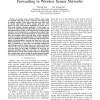7 search results - page 1 / 2 » Clairvoyant scheduling of random walks |
STOC
2002
ACM
14 years 5 months ago
2002
ACM
Two infinite walks on the same finite graph are called compatible if it is possible to introduce delays into them in such a way that they never collide. Years ago, Peter Winkler a...
ALGORITHMICA
2004
13 years 4 months ago
2004
We consider the problem of scheduling dynamically arriving jobs in a non-clairvoyant setting, that is, when the size of a job in remains unknown until the job finishes execution. ...
GLOBECOM
2010
IEEE
13 years 2 months ago
2010
IEEE
In wireless sensor networks (WSNs), sensor nodes are typically subjected to energy constraints and often prone to topology changes. While duty cycling has been widely used for ener...
SIGCOMM
2010
ACM
13 years 3 months ago
2010
ACM
In this paper we consider an alternative, highly agile approach called backpressure routing for Delay Tolerant Networks (DTN), in which routing and forwarding decisions are made o...
COLT
2000
Springer
13 years 9 months ago
2000
Springer
We give the first rigorous upper bounds on the error of temporal difference (td) algorithms for policy evaluation as a function of the amount of experience. These upper bounds pr...


